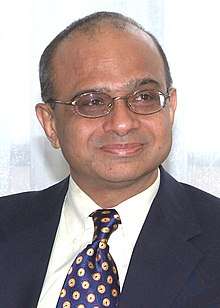Brahma Chellaney
Brahma Chellaney is a geostrategist and author who won the Bernard Schwartz Book Award.[1] He is a columnist for Project Syndicate.[2] He "commands respect", as one magazine put it, for his independent scholarship and for speaking truth to power.[3] He received the $20,000 Bernard Schwartz Award from the New York-based Asia Society for his work, Water: Asia's New Battleground, published by Georgetown University Press.[4]
Brahma Chellaney | |
|---|---|
 | |
| Born | 18 January 1962 New Delhi, India |
| Occupation | Academic |
Notable work | Water, Peace, and War and Water: Asia's New Battleground |
| Website | chellaney.net |
He has been described by Stanley Weiss as "one of India's top strategic thinkers,"[5] while The Wall Street Journal has labelled him a "prominent strategic affairs expert"[6] and The Guardian has called him "a respected international affairs analyst and author."[7] He has also been described as a "famous strategic pundit and TV talking head".[8]
Education and career
Chellaney was born in New Delhi. After passing the Senior Cambridge examination at Mount St. Mary's School, India, he did a Bachelor of Arts (Honours) from Hindu College, University of Delhi and a Master of Arts from the Delhi School of Economics. He holds a PhD in international arms control.[9]
He is a Professor of Strategic Studies at the New Delhi-based Centre for Policy Research; a Richard von Weizsäcker Fellow with the Robert Bosch Academy in Berlin; and a nonresident affiliate with the International Centre for the Study of Radicalization at King's College London.[10] In the mid-2000s, he was a member of the Indian government's Policy Advisory Group, which was chaired by the External Affairs Minister of India.[11][12] Before that, he was an adviser to India’s National Security Council, serving as convener of the External Security Group of the National Security Advisory Board.[13]
Among the institutions where he has held appointments include Harvard University, the Norwegian Nobel Institute, the Brookings Institution, the Paul H. Nitze School of Advanced International Studies at the Johns Hopkins University, and the Australian National University.[14][15]
Publications
Chellaney is the author of nine books.[16] Two of his most recent books relate to the geopolitics of water resources.[17] Another book, an international best-seller, focuses on how a fast-rising Asia has become the defining fulcrum of global geopolitical change.[18]
His peer-reviewed papers have been published in a number of journals, including International Security (journal), Survival (journal), Nature (journal), Orbis (journal), Asian Survey, Studies in Conflict & Terrorism, Disarmament, The Washington Quarterly, Security Studies (journal) and Politique étrangère.
He is also a prolific newspaper essayist.[19] Besides being a columnist for Project Syndicate, he publishes regularly in The Globe and Mail, The Japan Times, The Nikkei Asian Review, South China Morning Post, Hindustan Times and The Times of India. He has also been a contributor to The Wall Street Journal, The Guardian, The New York Times, and other newspapers and magazines.
Selected books
- Water, Peace, and War: Confronting the Global Water Crisis, Rowman & Littlefield, 2015.[20]
- Water: Asia's New Battleground, Georgetown University Press, 2019.[21]
- Asian Juggernaut: The Rise of China, India and Japan, HarperCollins USA, 2010.[22]
References
| Wikimedia Commons has media related to Brahma Chellaney. |
- Stanley A. Weiss (21 February 2009), Whom Do Sanctions Hurt?, International Herald Tribune; "Water: Asia's New Battleground |". Georgetown University Press.; "Asian Juggernaut;". HarperCollins Publishers. Retrieved 21 December 2019.
- Columnist Brahma Chellaney. "Project Syndicate".
- "Brahma Chellaney, Strategic thinker;". OPEN magazine. 24 May 2018. Retrieved 29 April 2020.
- "Brahma Chellaney wins Asia Society Bernard Schwartz Book Award;". Business Line. 25 October 2012. Retrieved 17 March 2020.
- Stanley A. Weiss (21 February 2009), Whom Do Sanctions Hurt?, International Herald Tribune
- "Delhi Isn't Buying Beijing's Coronavirus Hero Act;". The Wall Street Journal. 2 April 2020. Retrieved 3 April 2020.
- Jason Burke (7 April 2011), Indian Activist Anna Hazare Refuses to End Hunger Strike, The Guardian
- Shekhar Gupta (3 June 2014), First Person, Second Draft: Once upon a bloody time, Indian Express
- "Ph.D. Brahma CHELLANEY;". European Forum Alpbach. Retrieved 17 March 2020.
- "The S.T. Lee Distinguished Annual Lecture by Professor Brahma Chellaney;". S. Rajaratnam School of International Studies. 30 October 2018. Retrieved 17 March 2020.
- "Wilson Center;". Retrieved 21 December 2019.
- "25th Anniversary Debate". United Nations Institute for Disarmament Research. 5 February 2006. Archived from the original on 5 February 2006. Retrieved 9 January 2020.
- "Brahma Chellaney: India's hydro-diplomacy with Pakistan, Bangladesh and China;". Global Water Forum. 30 August 2019. Retrieved 17 March 2020.
- "Robert Bosch Academy |". Retrieved 21 December 2019.
- "25th Anniversary Debate". United Nations Institute for Disarmament Research. 5 February 2006. Archived from the original on 5 February 2006. Retrieved 9 January 2020.
- "Center for Policy Research |". Retrieved 21 December 2019.; "Nikkei Asian Review;". Retrieved 17 March 2020.
- "The S.T. Lee Distinguished Annual Lecture by Professor Brahma Chellaney;". S. Rajaratnam School of International Studies. 30 October 2018. Retrieved 17 March 2020.
- "Asian Juggernaut: The Rise of China, India, and Japan;". Google Books. Retrieved 17 March 2020.; "The S.T. Lee Distinguished Annual Lecture by Professor Brahma Chellaney;". S. Rajaratnam School of International Studies. 30 October 2018. Retrieved 17 March 2020.
- "The S.T. Lee Distinguished Annual Lecture by Professor Brahma Chellaney;". S. Rajaratnam School of International Studies. 30 October 2018. Retrieved 17 March 2020.
- G. John Ikenberry. "Water, Peace, and War: Confronting the Global Water Crisis;". Foreign Affairs. Retrieved 17 March 2020.
- Andrew J. Nathan. "Water: Asia's New Battleground;". Foreign Affairs. Retrieved 17 March 2020.
- "Asian Juggernaut: The Rise of China, India, and Japan;". Google Books. Retrieved 17 March 2020.
External links
- Brahma Chellaney: Columns internationally syndicated by Project Syndicate
- Brahma Chellaney: Columns published in The Japan Times
- Brahma Chellaney: Columns published in The Nikkei Asian Review
- Brahma Chellaney: Articles published in South China Morning Post
- Stagecraft and Statecraft: Brahma Chellaney's website
- Tweets: Brahma Chellaney on Twitter